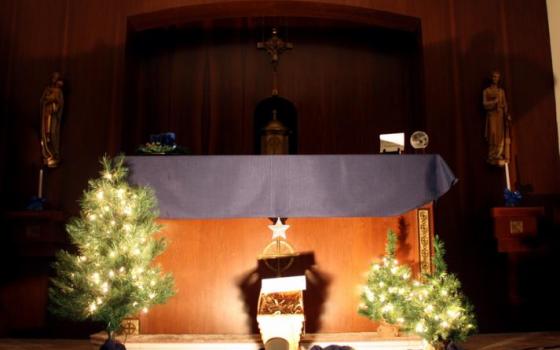That first Sunday night it appeared. In the stillness of the final day of November it had taken its place, where it was to remain for the coming four weeks of Advent. There in the chapel, a tiny manger had appeared. No wise men, no family, not even any animals. Simply, a manger.
And looking at it for the last three weeks, the same words have echoed in my head:
Rejoice! Rejoice! Emmanuel
shall come to thee, O Israel.
In the early morning December fog, rejoice. In the hectic hours of the work day, rejoice. In the darkness of a chapel lit by a single candle, rejoice. That haunting melody heralds the imminent arrival of our God.
Rejoice rings out in the darkness, softly gliding from my lips. “Emmanuel” follows. Rising and falling as it bellows out; six separate notes brimming with sweetness and melancholy at one and the same time.
This is God with us; the One who came, who comes, and who is coming. The One born into our lives over and over, who fills a space so sparse and so striking, the simplest throne, an empty space filled for feeding. The same place that that song comes from deep within me is where that empty space lies too. The question that remains: Will you make room?
There is nothing grand about it. It is barren and tattered. A space so sparingly simple, a question asked each day in so many ways. God’s only hope is to become alive among us; to teach us, in the essence of it all, what it means to be human.
Our humanity is a blessing and an invitation. We reflect the very One who made us and in living the life God calls us to discover more and more the space God carves out for us and within us in the world.
No one told me that becoming a sister would make me more human. If anything, I think I imagined that sisters were anything but. With perfectly coiffed hair and the ability to accomplish any task, they were seen by me as women larger than life – women given to others, who in return for their self-gift achieved something of sainthood in my mind.
That’s what I thought. Then, I got to know them.
In time, I discovered that the women I emulated were as human as I was. We laughed and cried and searched all the same. In fact, beyond all the beautiful words of charism and deep pulls of prayer, it was the experience of being with women striving towards holiness that appealed to me. Sisters, I found, weren’t any holier than others. They embraced their humanity and tried to uncover the goodness in the humanity of all those they encountered.
They tried to make room readily, whether that meant making another space at the table or admitting when they were wrong. To let God in, after all, you need to get out of the way. Such letting go creates a space where all can be fed; it clears a space inside so that God can enter, so Emmanuel can truly be God with us.
Making space and recognizing the dynamics of that relationship, we discover that Emmanuel is God and we are not. God is with us in our humanity. That’s the beauty of Christmas.
Advent gives us the opportunity to wait in hope. Hope that this time we’ll get it right; hope that we’ll be freer to make room today for God to enter in, for us to embrace our true self, and for us to face the realities of the world with grace and humility.
Jesus shows us the goodness we’re capable of and speaks to the deepest longings for the divine in our hearts. He calls us to more and we respond in the most human way possible- by promising in faith that we will strive to follow the will of God.
That promise is never perfect, but we try. In our humanity we strive as far as we are able to meet God in the here and now. As I ponder my own life as a woman religious, I am confronted continually by this reality. The vows I have made are, in and of themselves, human promises. They acknowledge my humanity and, in so doing, open myself to the opportunity to be blessed and consecrated by God.
Religious vows speak utterly and completely of our humanity. They commit us to lives of vowed poverty, celibate chastity and obedience. In professing them, we acknowledge that all that sustains us is God and beyond that, we are nothing. There’s a freedom in coming to realize this fact. No love, no power, no glory, no will is greater than God’s, and so, we listen attentively and act intentionally in our being.
This Christmas as much as I am struck by the empty manger in our chapel, I also realize that this is my first year living as a vowed member of a religious congregation. Somehow I find those two things inextricably linked. As I sit in waiting with and for a God who became human, I wrestle with the humanity I have so vividly and publically declared in these vows. There’s no telling where exactly they will lead me and yet, they direct me back to the solitary place I need to be this season: the manger.
There in darkness there is knowledge and anticipation of light, in emptiness there is readiness to be filled, and in the world’s soft tones of sweetness and melancholy there is humanity singing out for all to hear- Rejoice! Rejoice! Emmanuel.
[Colleen Gibson, SSJ, is a Sister of Saint Joseph of Philadelphia. Author of the blog Wandering in Wonder, she currently serves as assistant director of campus ministry at Chestnut Hill College in Philadelphia.]

